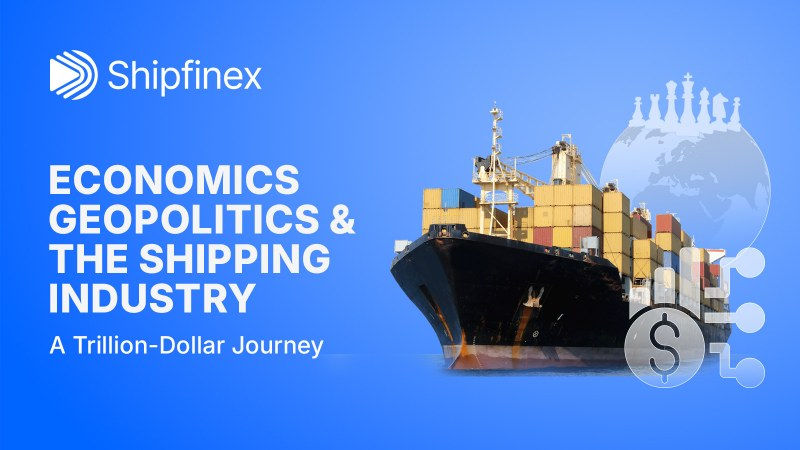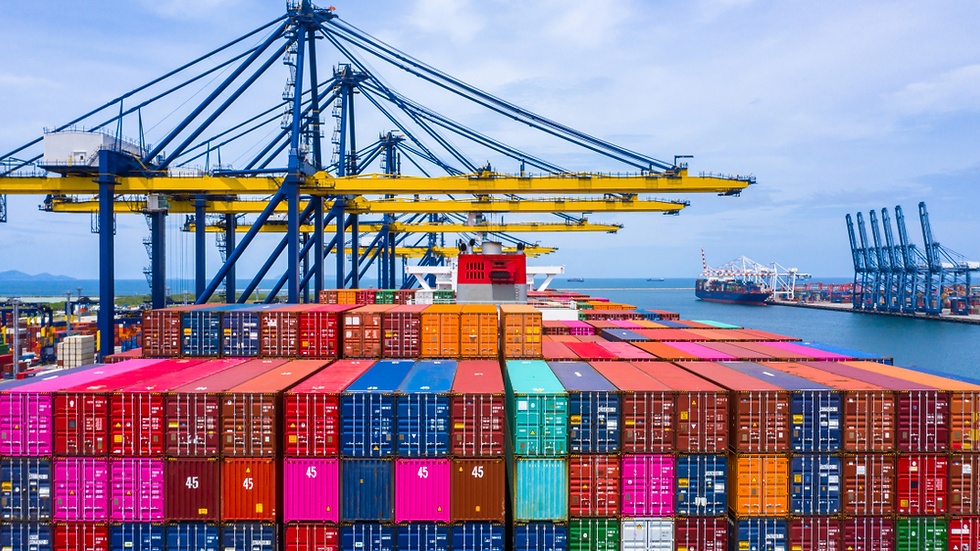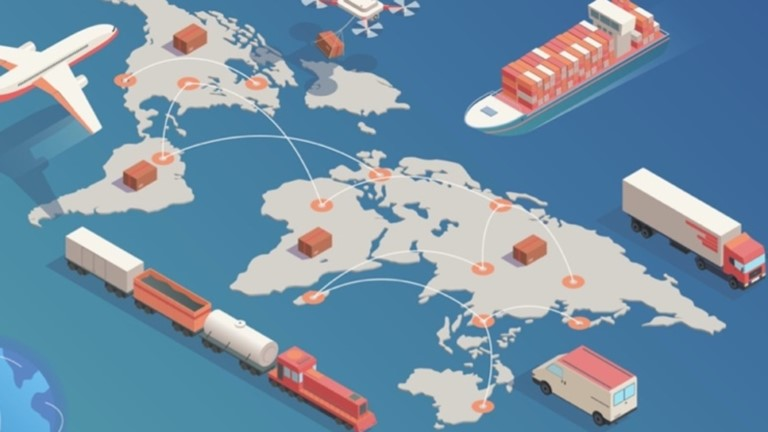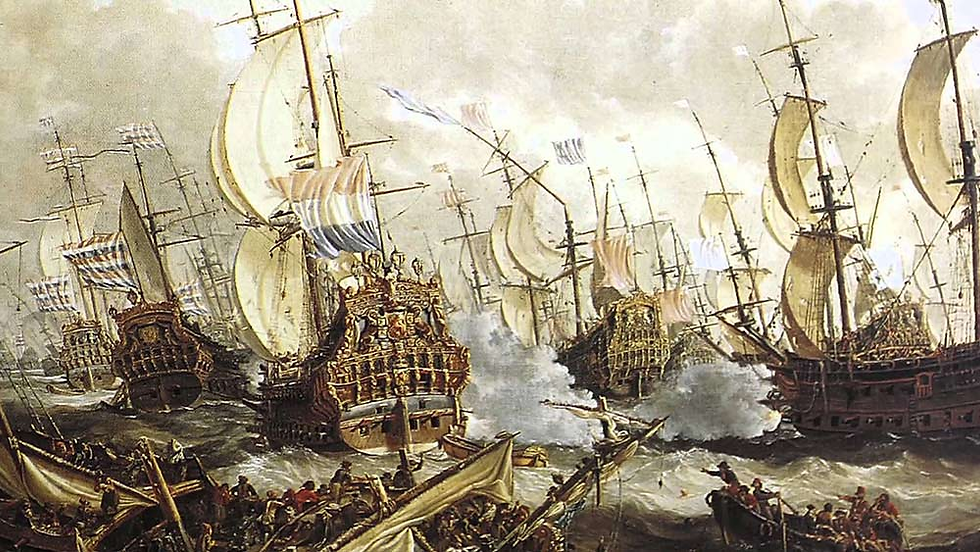Economics, Geopolitics and the Shipping Industry: A Trillion-Dollar Journey
- Dushyant Bisht

- Dec 1, 2023
- 9 min read
Updated: Dec 2, 2025
If all the cargo carried by the world's commercial ships were loaded onto a single vessel, it would stretch from New York to London, a distance of nearly 3,500 miles. Now that is huge, and probably why we have over 100,000 ships plying the seven seas -all day, every day.

The shipping industry is the backbone of global commerce, carrying about 90% of the world's goods. A diverse fleet, ranging from small freighters to colossal container ships, ensures the efficient transport of everything from raw materials to consumer goods, energy resources, and food. Without it, the intricately woven fabric of global trade would unravel, leading to economic chaos.
The intricate interplay between economics and geopolitics is a central theme in the ever-evolving landscape of the global shipping industry and international trade. These two interconnected forces shape the past, present, and future of this vital sector, impacting its structure, operations, and sustainability.
Economics fuels global trade, shaping shipping's supply and demand while geopolitics adds complexity, influencing trade routes and security. In this article, we explore how these factors shape the industry, from historical shifts like containerization to current challenges such as trade policy tensions and Middle East conflicts like the War in Yemen or the more recent Israel-Hamas conflict. Understanding this connection is vital for comprehending the industry's response to economic and geopolitical pressures.
Economics:
⦁ Global Trade and Containerization: Global trade has an enduring historical significance within the shipping industry, serving as its lifeblood. For centuries, maritime routes have been vital arteries, connecting nations and enabling the exchange of goods, resources, and cultures. The historical evolution of shipping is intrinsically linked to trade patterns, reflecting the ebbs and flows of global commerce.{maritime economics}

The transformative impact of containerization cannot be overstated. In the mid-20th century, the standardization of containers revolutionized the shipping landscape. These uniform steel boxes made cargo handling faster, and more efficient, and significantly reduced the costs associated with loading and unloading. This innovation allowed the shipping industry to scale up dramatically.
Containerization's benefits are multifaceted. It cut the time spent in ports, increased the volume of goods transported, and offered enhanced protection against damage and theft. This not only optimized the shipping process but also lowered operational expenses. As a result, containerization became the backbone of the global supply chain, transforming the economics of shipping.{Maritime geopolitics}
⦁ Ship Propulsion Through the Economic Lens: As one of my university professors, a former sailor once said, profitability is at the core of any business venture, and shipping is no different. Historically, steam engines were a primary choice for powering ships in the 19th and early 20th centuries. These engines utilized steam generated from boiling water to drive turbines, which turned the ship's propellers. However, steam engines had several limitations, including inefficiency, high maintenance costs, and a heavy reliance on coal or oil as fuel sources.

The transition from steam to internal combustion engines (ICE) marked a significant turning point. ICE engines, powered by diesel or heavy fuel oil, offered higher fuel efficiency, reduced maintenance costs, and greater reliability. This shift resulted in more streamlined operations and improved profitability, making them the preferred choice for modern vessels.
Today, the industry stands at the precipice of another transformation, focusing on cleaner and sustainable future fuels. With mounting concerns about climate change and stringent emissions regulations, there is a growing emphasis on reducing the environmental footprint of shipping. The search for alternative fuels, such as liquefied natural gas (LNG) and hydrogen, has gained momentum. {maritime economics}
LNG is a cleaner-burning fuel that emits fewer greenhouse gases than traditional marine fuels, making it an attractive option, especially as the Carbon Credit system comes into the picture. Hydrogen, an abundant element, is considered a potential zero-emission fuel for the future of shipping.
This transition toward cleaner fuels and propulsion methods is not only an economic necessity but also an imperative for addressing environmental challenges. It underscores the industry's commitment to sustainability and its role in contributing to a more environmentally responsible global trade system.
⦁ Globalization and Supply Chains: When it comes to globalization, the shipping industry assumes a central and indispensable role. It is the lifeblood of global supply chains, effortlessly connecting manufacturers to consumers across the globe. The ubiquity of everyday items, such as smartphones, machinery, fertilizer, food grains, etc serves as a testament to this intricate web of global production and distribution.

iPhones, for instance, are a manifestation of the globalized world. Designed in Silicon Valley, their components span the globe. Semiconductors are fabricated in Taiwan, precision parts come from Germany, assembly is in China, and they reach customers worldwide. And how is this done? Well, you guessed it right: containers. This exemplifies how the modern value chain is a globe-spanning endeavor.{maritime economics}
The impact of globalization on shipping economics is profound. The quest for efficiency, cost-effectiveness, and market reach has led to more complex logistics and transportation networks. These evolving demands include an increasing need for transparency and sustainability. As consumers become more conscious of environmental and ethical concerns, the shipping industry must adapt, embracing practices that are ecologically responsible and ethically transparent.
⦁ Powering the Global Economy post-COVID-19: The COVID-19 pandemic delivered a seismic shock to the global economy, sending reverberations throughout the shipping industry. The pandemic's outbreak prompted widespread lockdowns, disrupting global trade as nations grappled with the need to contain the virus's spread. These sudden and extensive restrictions ground global commerce to a halt, crippling supply chains and dealing a significant blow to the shipping industry.{Maritime geopolitics}
The pandemic-induced disruptions led to shifts in trade patterns and a growing emphasis on supply chain resilience. With the closure of the cruise ship market due to safety concerns and travel restrictions, the shipping industry faced an unprecedented challenge. Cruise ships, once a lucrative sector, lay dormant, and this setback required the industry to explore new opportunities.
Remarkably, amidst these challenges, the container sector emerged as a beacon of hope for the shipping industry. In 2020 and 2021, it reported record profits, benefiting from increased demand driven by the surge in e-commerce and revenge buying by consumers worldwide. This demonstrated the shipping industry's adaptability and resilience as it navigated the uncharted waters of a post-pandemic world.
Geopolitics
⦁ Trade Wars and Free Trade Agreements: A trade war is a state of heightened economic conflict between two or more nations, characterized by a series of retaliatory tariffs and trade restrictions, often a part of heightened geopolitical tension between two countries. These hostilities often emerge in response to protectionist measures taken by one nation, with its trading partners retaliating in kind. The consequences of a trade war can be detrimental, as it disrupts established trade relationships, impacts economic growth, and can lead to increased costs for consumers and businesses.

A prime illustration of a trade war is the ongoing dispute between the United States and China. Initiated in 2018, this trade war has seen both nations imposing tariffs on each other's goods, targeting a wide range of products from electronics to agricultural goods. This conflict has disrupted global supply chains and resulted in economic uncertainty worldwide.
In contrast, Free Trade Agreements (FTAs) serve as mechanisms to promote international trade by reducing trade barriers and facilitating commerce between countries. Notable examples of FTAs include the United States-Mexico-Canada Agreement (USMCA), the European Union's agreements with Canada (CETA) and Japan (JEFTA), and the Comprehensive and Progressive Agreement for Trans-Pacific Partnership (CPTPP) signed by several Pacific Rim nations.
These FTAs aim to create a more conducive environment for trade by eliminating or reducing tariffs, streamlining customs procedures, and harmonizing regulatory standards, ultimately benefiting the global shipping industry by promoting smoother and more efficient cross-border trade.{Maritime geopolitics}
⦁ Historical conflicts and their effects on Shipping: The Middle East has long been a hotbed of geopolitical challenges with far-reaching consequences for the global shipping industry. The ongoing conflicts in the region, such as the devastating Yemen war involving warring parties including the Saudi-led coalition and Houthi rebels, have disrupted maritime trade flows. Notably, the Strait of Hormuz, a critical passage through which a substantial portion of the world's oil supply transits, has been a focal point of tension. Iran's volatility and recurring threats to close the strait, coupled with international sanctions against the country, have heightened concerns for shipping economics.

The impact of Middle East conflicts on shipping is multifaceted. Vessels navigating through these turbulent waters face security risks and insurance premiums, while the unpredictability of the situation can lead to fluctuations in oil prices, affecting shipping costs and demand. Moreover, the legacy of Cold War geopolitics in the region continues to influence shipping dynamics as countries vie for influence, impacting trade routes and shipping lanes.
Contested regions, like the South China Sea, Persian Gulf, and Black Sea, have not only raised navigational risks but also threatened the stability of trade routes. This underscores the intricate interplay between geopolitics and the shipping industry, which must navigate through these tumultuous waters with adaptability, resilience, and a keen understanding of the historical and contemporary factors shaping global trade and commerce.
⦁ Russia-Ukraine War: The Russia-Ukraine war has unleashed a cascading impact on the global shipping industry and logistics. This conflict, occurring in the wake of the pandemic, disrupted supply chains and led to soaring commodity prices. Agricultural infrastructure in Ukraine was damaged, and Russia's control over the Black Sea and Azov Sea posed significant obstacles to grain shipments. While a United Nations deal aimed to unblock Ukrainian grain exports, Russia's continued aggression undermines its effectiveness.

The consequences of this war are felt in rising prices for natural gas, coal, soybeans, corn, and crude oil—commodities in which Russia plays a key role. Additionally, fertilizer prices, vital for crops and animal feed, have surged due to pandemic-driven demand and stockpiling.
The energy sector, heavily dependent on Russia, grapples with soaring oil and gas prices, posing challenges for global supply chains, especially those reliant on energy-intensive logistics. Port closures have raised ocean shipping costs, and container shortages have driven up prices for essential goods like grains. To mitigate these disruptions, new initiatives like China-Europe freight trains have been launched.{Maritime geopolitics}
The Black Sea Grain Initiative, signed amid the conflict, offered hope by reopening key Ukrainian seaports and facilitating grain shipments, stabilizing global food prices.
However, its termination led to rising prices and trade disruptions, particularly for commodities like wheat and maize, essential for the African market. The shipping industry must navigate these challenges, seeking solutions to counteract the war's adverse effects on supply chains and trade routes. This illustrates how geopolitical conflicts can ripple through the global economy, leaving a profound impact on the shipping industry, supply chains, and international trade.{maritime economics}
⦁ Russian oil price cap: The Russian oil price embargo, known as the "Price Cap Scheme," was introduced by a coalition comprising the EU, G7, and Australia due to the Russia-Ukraine War. This legislation, effective from December 5, 2022, aims to maintain the global supply of Russian oil while limiting Russia's earnings from its oil exports. Under this scheme, P&I Clubs can provide coverage for Russian crude oil shipments to countries outside the coalition, as long as the price of the cargo remains at or below $60 per barrel.

The impact of this embargo on shipping is significant. Clubs, shipowners, and charterers are now obligated to ensure the compliance of Russian oil cargoes with the Price Cap. Attestations, or contractual commitments, are required from contractual counterparties to confirm that the cargo's price does not exceed the cap. These parties must also maintain records of these transactions for up to five years.
Transitional arrangements allow ships with Russian crude oil onboard, sold above the Price Cap, to complete their voyages if offloaded by January 19, 2023. However, non-compliance may lead to insurance withdrawal. The UK, US, and EU each have their own legislation, and international shipping clubs are adapting their sanctions exclusion clauses accordingly.
While these measures are intended to reduce Russia's oil revenue, there are risks of evasion through false documentation or ship-to-ship transfers. Compliance is vital for insurers, shipowners, and charterers, but they must be cautious to prevent inadvertent violations. Moreover, there are provisions for emergencies, and the legislation recognizes the need to address maritime emergencies without hindrance. Nonetheless, the strict enforcement of these measures underscores the serious consequences of non-compliance.{
⦁ Israel-Hamas War: The Israel-Hamas conflict, which has erupted with intensity, is impacting the shipping industry. Ashkelon, located just 10 kilometers north of the Gaza Strip, has been closed due to ongoing military operations. International shipping vessels have been cautioned to exercise extreme caution when transiting near the region. Notably, Ashkelon, Israel's largest oil terminal, has been shut down during the conflict. Additionally, Israel's energy ministry has instructed Chevron to close the Tamar natural gas field off the northern coast.

While immediate effects on shipping and commodities may be limited, the broader geopolitical context in the region, particularly involving Iran as an ally of Hamas, could have longer-term consequences. The conflict's indirect effects may include the potential impact on oil markets and the tightening of the tanker market, especially for Very Large Crude Carriers (VLCCs), as demand rises amid concerns about oil shortages. The Israel-Hamas war adds another layer of complexity to an already tight market, potentially affecting shipping rates in the near term.
In conclusion, the global shipping industry is an intricate dance of economics and geopolitics, with both forces shaping its past, present, and future. Economics, as the lifeblood of the industry, has evolved over centuries, from the historical significance of maritime trade routes to the transformative impact of containerization and the ongoing shift towards cleaner, sustainable fuels. The COVID-19 pandemic tested the industry's resilience and adaptability, revealing its ability to thrive in the face of unprecedented challenges.
On the geopolitical front, trade wars and free trade agreements can disrupt established trade relationships, impacting global supply chains and causing economic uncertainty. Geopolitical conflicts in regions like the Middle East and the Russia-Ukraine war have far-reaching consequences, influencing trade routes, security risks, and the stability of supply chains. Recent events like the Russia-Ukraine war and the Israel-Hamas conflict underscore how these geopolitical factors can have a profound impact on shipping rates, commodity prices, and the overall global economy.


